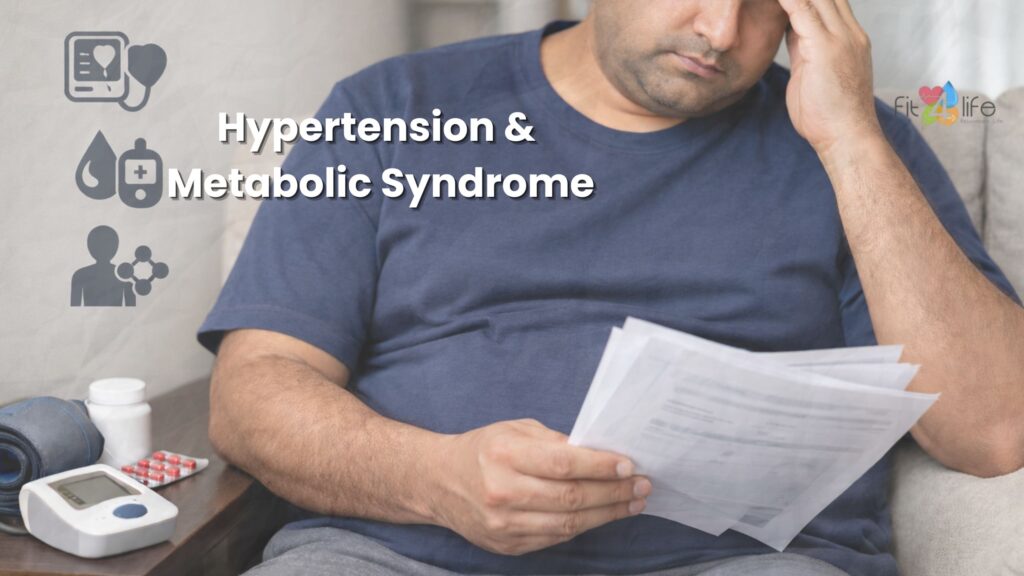Managing Hypertension and Metabolic Syndrome Through Personalized Nutrition by Deepika Chalasani, Top Nutritionist in Hyderabad
Name: Arvind
Age: 41 years
Location: USA
Case History: A 41-year-old male software engineer presented with a medical history significant for hypertension, type 2 diabetes mellitus, and dyslipidaemia.
His lipid profile revealed elevated total cholesterol, triglycerides, a high triglyceride-to-HDL cholesterol (TG/HDL-C) ratio, low HDL-C levels, and increased LDL-C concentrations—collectively indicating a high atherogenic risk and increased predisposition to cardiovascular disease.
Recent laboratory investigations demonstrated elevated serum alanine aminotransferase (ALT/SGPT) levels, suggestive of hepatic steatosis in the context of metabolic dysfunction, consistent with a diagnosis of non-alcoholic fatty liver disease (NAFLD). Additionally, his serum 25-hydroxyvitamin D levels were found to be deficient, a condition often associated with insulin resistance, impaired immune modulation, and worsened cardiometabolic outcomes.
Given the coexistence of multiple components of metabolic syndrome—including central obesity, insulin resistance, dyslipidaemia, and elevated blood pressure—Arvind sought intervention aimed at weight reduction and optimization of glycaemic and blood pressure control. His primary goal was to achieve metabolic improvement and reduce dependence on medication through evidence-based lifestyle and dietary modifications.
Approach by the best online nutritionist, and dietician in Hyderabad, Telangana, India Deepika Chalasani
After carefully examining his condition and dietary preferences, his diet plan was designed to be simple and balanced in macronutrients and micronutrients.
We advised him to begin his day with two glasses of warm water to promote hydration, stimulate digestion, and support natural detoxification—an essential practice for overall metabolic and liver health.
To provide sustained energy and improve insulin sensitivity, we recommended incorporating complex carbohydrate sources such as hand-pounded rice, steel-cut oats, quinoa, ragi, sourdough bread, and millet-based rotis like bajra or jowar, and buckwheat. These low-glycaemic index foods were introduced in measured portions to prevent postprandial sugar spikes and reduce hepatic fat accumulation. Their high fibre content supported gut integrity and metabolic balance.
To ensure optimal protein intake vital for preserving lean mass, regulating glucose metabolism, and supporting hepatic repair, we used a balanced mix of high-quality animal, plant-based, and supplemental protein sources. Lean proteins like chicken and fish (70–90g per serving) were distributed across meals and prepared using healthy methods like grilling or pan-cooking with minimal oil. Egg-based options (1 whole egg + 2 whites) were also incorporated into breakfast or snacks.
On vegetarian days, protein intake was supported through tofu, whole dals, paneer, and Greek yogurt. These were included in appropriate portions for their digestibility and complete amino acid profile.
Additionally, to bridge nutritional gaps without overburdening the digestive system, a clean, low-carb protein powder was introduced—particularly during snack hours—to improve satiety, manage blood sugar levels, and help meet the daily protein requirement.
Colourful, seasonal vegetables like Brussels sprouts, broccoli, mushrooms, pumpkin, lettuce, carrots, beetroot, a variety of beans, ash gourd, ridge gourd, and ivy gourd were integrated across meals to provide antioxidants and anti-inflammatory compounds. These vegetables support detoxification and are gentle on the liver and gut.
Fruits with a low glycaemic index such as berries, guava, papaya, apple, and pomegranate were encouraged to avoid oxidative stress and support micronutrient status. High-sugar tropical fruits were restricted due to their impact on glycaemia and hepatic fat accumulation.
Mindful use of healthy fats was emphasized. Olive oil, avocado oil, and peanut oil were used for cooking, and desi ghee (5g per meal) was added to main meals to provide essential fatty acids, improve fat-soluble vitamin absorption, and enhance flavour without overwhelming liver function. Fried foods and ultra-processed items were limited to once a week.
He used to travel by air to another location for 14 days in the month, and for the remaining 14 days, he would be with his family. Suitable options were provided to accommodate both individual cooking and integration with family meals. We provided stepwise, personalized guidance to ensure he could sustain these changes confidently. Our focus on clarity, simplicity, and practical execution helped him make conscious food choices, improve metabolic markers, and reduce reliance on medication—while supporting long-term cardiovascular and liver health.

Results:
Within the first few months of following the personalized diet plan, he experienced significant improvements in multiple health parameters. His weight reduced from 94 kg to 84 kg, contributing to improved insulin sensitivity and reduced central adiposity. This has been his lowest weight in the past 18 years. His blood pressure levels also improved significantly, making his hypertension more manageable, and his healthcare provider stopped his hypertensive medications but asked him to share his blood pressure readings.
Plasma glucose levels dropped remarkably from 231 mg/dL to 85 mg/dL, reflecting restored glycaemic control and improved pancreatic efficiency. As a result, his physician was able to reduce the dosage of his diabetes medication.
There was a marked improvement in his lipid profile: total cholesterol decreased from 220 mg/dL to 197 mg/dL, triglycerides reduced from 250 mg/dL to 164 mg/dL, and the TG/HDL ratio improved from 6.5 to 3.8, indicating a lower atherogenic risk. His HDL cholesterol levels increased from 38 mg/dL to 43 mg/dL, while LDL reduced from 137 mg/dL to 125 mg/dL, suggesting enhanced cardiovascular protection.
Liver enzyme SGPT (ALT), which was elevated at 56 IU/L indicating hepatic stress, normalized to 26 IU/L, reflecting improved liver function and regression of fatty liver.
These changes collectively reflect a substantial improvement in metabolic health, a decreased risk for cardiometabolic disease, and a successful shift toward medication independence.
Deepika Chalasani is a Clinical Nutritionist, Mind and Body Transformation Coach, and co-founder of Fit4Life India, an integrated nutrition and wellness organization for Indians that provides complete solutions, addressing health and wellness challenges of individuals by working on their overall well-being. Deepika, the best nutritionist in Hyderabad for weight loss and online dietician can be contacted via email at deepika.chalasani@gmail.com or Mobile at +91 9381525943
